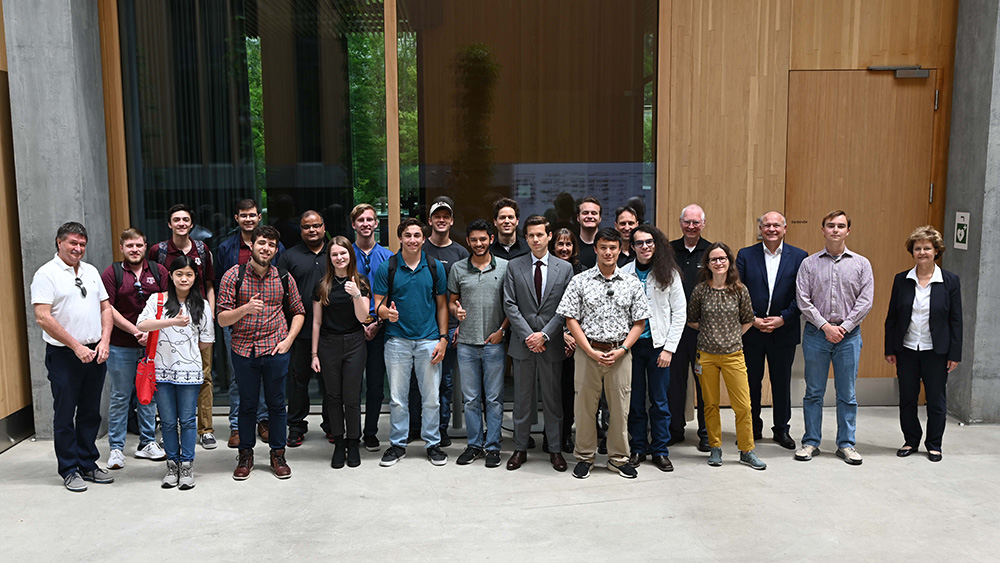
A group of 18 students from the Department of Nuclear Engineering at Texas A&M University recently experienced a new side of Switzerland through a study abroad trip with Dr. Lee Peddicord, professor in the department.
The trip gave students a hands-on look into the way Switzerland manages the interim storage and final disposal of spent fuel from nuclear reactors and other radioactive waste, known as the back end of the nuclear fuel cycle and radioactive waste management.
The trip took place over a two-week period, taking students to many notable nuclear facilities in the country. Most notable were visits to the Beznau Power Plant, the oldest operating power plant in the world; the Paul Scherrer Institute and the Spiez Laboratory, two premier national laboratories; and the Mont Terri Rock Laboratory and the Grimsel Test Site — two world-class underground research laboratories.
While at Beznau, students were able to get a hands-on feel of the plant’s turbine housing. Senior Ethan Louis ’23 said it was exciting to see what he had just studied in Dr. Mark Kimber’s thermodynamics course fully operational in front of him.
Having the opportunity to go and touch a turbine housing — what you’ve been studying — is a feeling and experience that you’re just not going to get in the classroom.
Students were able to meet with scientists, researchers and government officials to learn about the country’s nuclear energy program. Merrick Hoffman ’24 said he enjoyed learning how government officials spent time working with a local farm owner to use his land as a repository site for spent fuel.
“They are working with this farmer,” Hoffman said. “They are taking the time to communicate with him and it’s really interesting how they will take that time for one individual so he understands what is going on.”
According to the U.S. Energy Information Administration, spent nuclear fuel remains temperature hot and highly radioactive, so it will spend time in cooling pools which are usually about 40 feet deep with reinforced concrete and lined with steel. The water acts as a cooling method and blocks the release of radiation.
When the pools are nearing fullness, the spent fuel is moved to interim storage in containers known as dry casks — a large concrete cylinder — usually on the power plant’s site.
The final step is to collect spent fuel from interim storage and place them in a final disposition site in permanent underground repositories. Switzerland is looking at multiple sites, such as the one Hoffman visited, to create an underground repository for the spent fuel.
A newfound determination
The trip allowed Hoffman to gain a new drive and determination for the field of nuclear engineering by being able to talk with other nuclear scientists and seeing their dedication to the innovation of nuclear science. The trip reinvigorated his own desire to be a nuclear engineer.
“To meet all these different individuals, both young and old, with so many different years of experience and seeing how passionate they were is really important, especially as a student,” Hoffman said. “It really gets you excited to pursue this career and major. This trip provided the unique experience to have that kind of interaction.”
Louis and Hoffman both felt the trip created an opportunity for classmates who had otherwise never met the chance to become friends.
“There were 18 of us in the group and we were all very close by the end of the trip. We would get together and go visit ruins or waterfalls and meet people we never knew before the trip,” Louis said. “I think having a small group encourages that kind of thing and enhances the experience.”
“I got to meet these wonderful individuals and fellow students that I would have never known before and I think would have never fully appreciated,” Hoffman said. “This trip brought us together.”
A global stepping stone
Louis said the trip showed him the viability of a career outside of the U.S. He said before he traveled to Switzerland, he and his fiancée would often talk about where they would move after graduation. He was unsure before, but the trip has allowed him to realize other options and opportunities on a global scale.
“After going on this trip I realized how much I really enjoy the spent fuel aspect and so I’ve been able to narrow down a couple of companies and look at job positions,” Louis said. “This trip definitely provided a bit of career guidance for me.”
Hoffman was introduced to the option of a master’s program at the Swiss Federal Institute of Technology-Zurich under Dr. Annalisa Manera, something he said he would not have known about otherwise.
“I’m glad I found this opportunity because it is a surefire way to kickstart my career,” Hoffman said. “Study abroad can open you up to all these opportunities and meet people who you could potentially work with.”
Hoffman believes study abroad trips should be seen as an opportunity for any student who wants to become an engaged global citizen.
“Consider the intellectual value that you gain from studying abroad,” Hoffman said. “You get the unique opportunity to see someone with different ideas and perspectives and talk with them and find new ways to solve problems.”